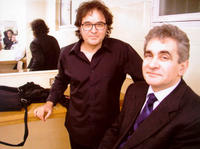
Atxaga on Ordorika
Towards 1970 there began to materialise the Basque City. Never before had the noun and the adjective joined together. One spoke of the Mountain, the Earth, the Nation, all of them Basque; but the privileged space where the world became truly wide seemed forbidden to those who whished to express themselves in the language that sustains the adjective, the Basque tongue. It was as if someone, the Spirit of the Time, for example, might have hurled out an order: "Either change your language, or change your place". Which in the case of Ruper Ordorika, meant: "Dear friend, either devote yourself to romantic music or to patriotic music. And if not, give it up". The message was clear. It meant solitude. And it was a curse. A snare.
Ruper Ordorika put up with the solitude, and against the long road he opposed his will and his intelligence. Ruper Ordorika forgot the curse: from his first records, his materials was diverse, general, non-religious: he could do with the laundry, a van, or a visit from a woman. Ruper Ordorika eluded the snare: instead of crossing to the other side of the border, he remained close to it and took on its history. He didn't become the chamaleon of the storybook tale, neither in a branch of the General Bank of Music, nor in the international Basque Singer for Tourists. He remained a personal creator, with committed lyrics and music towards his loved, hated, distant, close Basque City.
Bernardo Atxaga
No comments:
Post a Comment